| Srl | Item |
| 1 |
ID:
150088
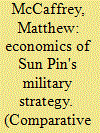

|
|
|
|
|
| Summary/Abstract |
Sun Tzu's Art of War is well-known for its influence in both strategic and management studies. However, most research has overlooked the Art of War produced by Sun Tzu's descendent, Sun Pin. This text, while not as easily interpreted as its more famous ancestor, also contains discussions of strategic decision making that can be examined from an economic or managerial point of view. It therefore merits attention as an important crossroads between strategic studies and other social sciences. The major purpose of this article is to survey and explain Sun Pin's economic ideas on several subjects: scarcity, proper resource management, war finance, the use of incentives, and the entrepreneurial element in strategic decision-making. A minor purpose is to contrast Sun Pin's approach to that of Sun Tzu, who emphasized many of the same concepts.
|
|
|
|
|
|
|
|
|
|
|
|
|
|
|
|
| 2 |
ID:
150082
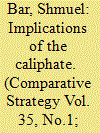

|
|
|
|
|
| Summary/Abstract |
Regardless of the outcome of the military campaign, the “Islamic State” is a watershed. Its regime derives from the personage of the Caliph as the “Substitute of the Prophet of Allah” and “Commander of the Believers.” But it seeks not to restore the model of previous Caliphates, but to resurrect the regime of the Prophet who spread Islam “with the sword” so that “the word of Allah becomes supreme.” The Caliphate paradigm is incompatible with tolerance of heterodox Muslim communities or non-Muslim citizens or with peaceful relations with other Muslim states or the non-Muslim world. It precludes a “Westphalian” order; will exacerbate the Sunni–Shiite conflict, radicalize Muslim communities across the globe, fan the flames of Islamist terrorism and will give birth to “Caliphate Archipelagos”—small groups that swear their loyalty to the Caliph and are willing to act in his name in their territories.
|
|
|
|
|
|
|
|
|
|
|
|
|
|
|
|
| 3 |
ID:
150086
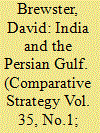

|
|
|
|
|
| Summary/Abstract |
The Persian Gulf is a crucial strategic space for India. Given India's size, its growing economic and military power, and its proximity, one might expect that India would be a natural regional security provider or even a hegemon in the gulf. But India's ability to project its influence in the area is severely constrained by ideological factors, domestic politics, and longstanding patterns of alignment and rivalry. This article explores India's contemporary security relationships with the gulf in light of these structural constraints.
|
|
|
|
|
|
|
|
|
|
|
|
|
|
|
|
| 4 |
ID:
150084


|
|
|
|
|
| Summary/Abstract |
It would simplify matters for U.S. officials and sea-service officers enormously if there were an Asian way of maritime war. It would make Asian governments and navies more predictable. They would tend to view the strategic setting similarly, harness sea power for similar political and strategic aims, and design doctrines and forces that were roughly compatible. Unfortunately, however, disparities between Asian societies and civilizations work against any common Asian approach to sea power. There is no substitute for close study of individual societies and cultures when forging ties with seafaring Asian states.
|
|
|
|
|
|
|
|
|
|
|
|
|
|
|
|
| 5 |
ID:
150083
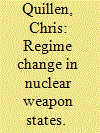

|
|
|
|
|
| Summary/Abstract |
The threat of losing control of nuclear weapons during political crises is not sufficiently prepared for by either individual nuclear powers or the international community. The relative success of securing the Soviet nuclear arsenal after the collapse of the USSR has lulled the world into a false sense of security, but the threat is real and may be increasing. Drawing upon historical case studies in which the government of a nuclear weapon state failed, the author recommends policy options for future scenarios in the hope of preventing potential nuclear disasters in newly proliferating states such as North Korea and Iran.
|
|
|
|
|
|
|
|
|
|
|
|
|
|
|
|
| 6 |
ID:
150087
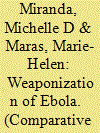

|
|
|
|
|
| Summary/Abstract |
In 2014, the world saw an unprecedented outbreak of Ebola that spanned several countries, including the United States. Considered a highly contagious, extremely virulent bioterrorism agent, the introduction of Ebola within U.S. borders uncovered myriad deficiencies in emergency response and preparedness, international travel policies and restrictions, and how the U.S. healthcare system handles such viral agents in infected individuals. This article explores the potential for the weaponization of Ebola, looking in particular at its plausibility for use in a bioterrorism attack. After describing the epidemiology of Ebola and its classification as a bioterrorism agent, this article examines the risk of the weaponization of Ebola and delineates the weaknesses identified in the ability of the United States to handle Ebola cases during the 2014 outbreak, which could be exploited by terrorists to effectively execute a bioterrorism attack.
|
|
|
|
|
|
|
|
|
|
|
|
|
|
|
|